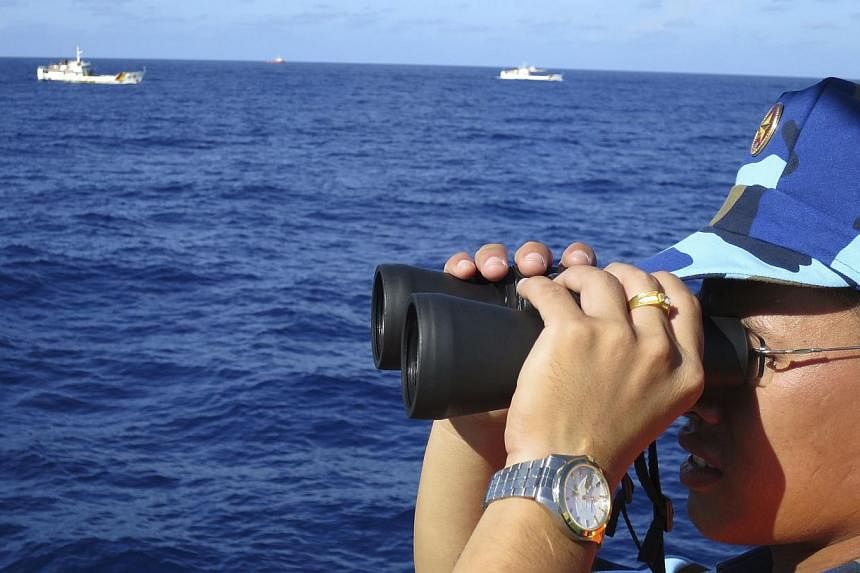HISTORICALLY, ambiguity has characterised relations between China and Vietnam. Despite China's strong cultural influence, Vietnam has repeatedly resisted the larger power's efforts to dominate it. Since the 1990s, economic relations with China have become important for Vietnam's prosperity.
However, since 2010, maritime contentions have resurfaced and intensified. The most recent episode took place in the context of a wider push by China to assert its claims in both the South China and East China Seas.
In early May, China's state-owned China National Offshore Oil Corporation (CNOOC) moved deep-sea drilling rig HD-981 into waters south of the Paracels, 240km from Vietnam's coast.
As this was within Vietnam's claimed Exclusive Economic Zone, Hanoi protested strongly and appealed for regional and international support, while civil society groups mounted peaceful demonstrations in Vietnamese cities. Vietnamese users of social media, particularly Facebook, widely denounced the Chinese actions.
The subsequent outbreak of anti-Chinese rioting on May 13 was unprecedented in modern Vietnam. Across 22 Vietnamese provinces, gangs attacked and sometimes burned down mainly foreign-owned factories, killing several Chinese workers. Of 351 affected businesses, only 14 were owned by Chinese interests; most of those damaged were Taiwanese- or Korean-owned, and some belonged to Singapore companies. While the international media reported these attacks as manifesting near-uncontrollable anti-Chinese patriotism, more complex factors may have been at play.
Beneath the veneer of Vietnam's monolithic one-party rule, foreign investment and the growing importance of the market have created new domestic forces that challenge authoritarianism.
With the growth of education and employment, the urban middle class has expanded, while the peasantry depends less on the state. New social groups and opportunities for political expression have emerged, notably through the social media. There is enormous pressure on the party to meet public expectations. The significant slowing of Vietnam's economic growth in 2012 and 2013 provoked discontent and undermined the party's credibility.
The frustration of rising middle-class expectations can be seen in public outcry over corruption among officials, and in support of wider property rights. The party, recognising the need to boost economic growth and reduce socio-economic disparities, is restructuring the banking sector and privatising state-owned enterprises, while making efforts to expand foreign trade and investment.
Trade and investment relations with China have become increasingly important to Vietnam's economy. Reflecting a sense of shared interests - existential as well as practical - the Chinese and Vietnamese parties have maintained ties. While some sources suggest that party-to-party relations may now be little more than nominal, others suggest that there are pro- as well as anti-Chinese elements within Vietnam's party leadership. It was against this background that the longstanding maritime stand-off with China escalated in May. Popular expressions of nationalism, focused on the contention with China, have acted as a lightning rod for Vietnamese political activism.
Vietnamese popular opinion, fed by the party's long-established policy of cultivating anti-Chinese sentiment and emboldened by corruption scandals linked to Chinese trade, has steadily hardened against Beijing. Ordinary Vietnamese increasingly call for robust responses to China's assertiveness and infringements of their interests. While popular sentiment has focused on China's South China Sea encroachments, there is also simmering concern over Hanoi's management of cross-border trade with China, Chinese investment contracts and infrastructure projects, and over maritime environmental issues.
Vietnam's internal security apparatus has evidently been concerned about the potential for nationalist manifestations to escalate out of control and to become the vehicle for wider political demands that could challenge the party's leadership. Anti-Chinese sentiment appears to have taken on a life of its own. Strong public feelings can be seen not only in demonstrations, but also in blogs and forums and in daily discourse.
It is impossible to gauge the extent to which Hanoi's responses to Chinese actions in the South China Sea reflect a need to accommodate popular sentiment. At the very least, this sentiment has certainly increased the pressure on the party and state to respond firmly to Beijing's assertive behaviour in the South China Sea.
In March, amid public outrage over alleged Chinese assaults on Vietnamese fishing vessels, Hanoi demanded compensation from China. In May, after Beijing announced that it would move the HD-981 rig into disputed waters, Vietnam said it would "resist intrusion" and "protect its waters".
The rioting against foreign businesses represented an even more worrying form of domestic pressure, though it remained unclear who was ultimately responsible for the attacks.
The violence seen in May seems to have been premeditated, well-coordinated and organised by "professional" agitators unconnected with the patriotic non-governmental groups apparently behind persistent peaceful anti-Chinese demonstrations. Sources linked to the Vietnamese government reject suggestions that elements in the party or state exploited an opportunity to discredit the country's nascent civil society or that the violence might point to serious divisions within the party over how to handle the dispute with China.
Some assessments, pointing to the attacks' lack of focus on mainland-owned factories and Bei-jing's apparent overly reactive large-scale evacuation of its nationals by ship, have inferred a Chinese hand. Others point to the Vietnamese diaspora in the United States playing a role.
Although the rig was removed from contested waters in mid-July, reports have also surfaced that the CNOOC might move more oil rigs into disputed areas and that Hanoi might follow Manila's example by submitting its maritime claims to the Arbitral Tribunal of the United Nations Convention on the Law of the Sea. It thus seems likely that tensions over conflicting claims could intensify. It seems equally probable that contention with China will continue to pose important challenges for Vietnam's party and state apparatus domestically and regionally.
Though the motivations for the riots remain unclear, they show that Vietnam's leaders need to calibrate their responses to Beijing's pressure with a view not only to deterring Chinese pressure, but also to managing an uneasy domestic political environment.

